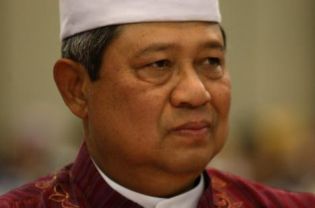 | INDONESIA |
Indonesian President Calls for Calm at Mosques
Nivell Rayda, Ulma Haryanto & Antara | October 02, 2010

In this file photo, President Susilo Bambang Yudhoyono has spoken out in the strongest terms yet about religious violence. (Antara Photo)
Jakarta. In his strongest statement so far on religious extremism, President Susilo Bambang Yudhoyono said on Friday that mosques should not be used to preach hate and violence.
“We should be providing comfort and peace to everyone and not turn mosques into places to encourage provocation,” Yudhoyono said after opening the renovated Baiturrahim Mosque inside the State Palace complex.
The president said that mosques should be places where brotherhood and close ties between all peoples were encouraged and strengthened.
“Therefore, I urge that in the future, together, not only the congregation at Baiturrahim Mosque but all congregations wherever they are, make mosques centers of good deeds and benevolence,” Yudhoyono said.
The decades of pervasive monitoring of mosques under the dictator Suharto ended with his resignation in 1998, allowing some of those places of worship to foster a more hard-line and radical form of Islam.
Just hours after the president’s comments, a mosque belonging to the minority Ahmadiyah sect in Ciampea, Bogor, was torched.
A National Police spokesman, Insp. Gen. Iskandar Hasan, said the attack on the mosque was caused by unconfirmed rumors that Ahmadiyah members had stabbed two local villagers.
He said one car, part of the mosque and four houses were torched and that 250 police officers were at the site.
“They came with sticks, axes and sharp weapons. Hundreds of people showed up and started burning,” said Muchsin, an Ahmadiyah leader. ?
Worries over violent extremism again arose with Thursday’s botched suicide bombing in Bekasi.
Preliminary investigations show the bicycle bomber, Ahmad, who is still in critical condition, was a drifter influenced by jihadi messages and not connected with any major terrorist network.
Criminologist Erlangga Masdiana, ?from the University of Indonesia, said the government must impose stricter regulations on the publishing of jihadi material and expand the scope of Internet censorship, which was fixated on pornography.
“The government must identify the type of messages that can disrupt national stability or inspire others to carry out terrorist attacks and see to it that they are inaccessible,” Erlangga told the Jakarta Globe.
He said the government and religious groups should also spread messages of tolerance and peace “so that more and more people will become aware that terrorism is not the answer and that terror attacks are damaging Islam.”
Ronny Nitibaskara, another criminologist from the University of Indonesia, said law enforcers would have to “rethink” their approach to terrorism.
“We can no longer assume terrorists are using the same old ways and the attacks are being carried out by the same types,” he said.
Ken Conboy, a terrorism expert and author, said: “Instructions on how to build an explosive and messages of extremisms are available in printouts and DVDs distributed from one person to the next.”
Many Web sites, he said, spread the word of Osama Bin Laden, while others give detailed instructions on bomb making.
“We should be providing comfort and peace to everyone and not turn mosques into places to encourage provocation,” Yudhoyono said after opening the renovated Baiturrahim Mosque inside the State Palace complex.
The president said that mosques should be places where brotherhood and close ties between all peoples were encouraged and strengthened.
“Therefore, I urge that in the future, together, not only the congregation at Baiturrahim Mosque but all congregations wherever they are, make mosques centers of good deeds and benevolence,” Yudhoyono said.
The decades of pervasive monitoring of mosques under the dictator Suharto ended with his resignation in 1998, allowing some of those places of worship to foster a more hard-line and radical form of Islam.
Just hours after the president’s comments, a mosque belonging to the minority Ahmadiyah sect in Ciampea, Bogor, was torched.
A National Police spokesman, Insp. Gen. Iskandar Hasan, said the attack on the mosque was caused by unconfirmed rumors that Ahmadiyah members had stabbed two local villagers.
He said one car, part of the mosque and four houses were torched and that 250 police officers were at the site.
“They came with sticks, axes and sharp weapons. Hundreds of people showed up and started burning,” said Muchsin, an Ahmadiyah leader. ?
Worries over violent extremism again arose with Thursday’s botched suicide bombing in Bekasi.
Preliminary investigations show the bicycle bomber, Ahmad, who is still in critical condition, was a drifter influenced by jihadi messages and not connected with any major terrorist network.
Criminologist Erlangga Masdiana, ?from the University of Indonesia, said the government must impose stricter regulations on the publishing of jihadi material and expand the scope of Internet censorship, which was fixated on pornography.
“The government must identify the type of messages that can disrupt national stability or inspire others to carry out terrorist attacks and see to it that they are inaccessible,” Erlangga told the Jakarta Globe.
He said the government and religious groups should also spread messages of tolerance and peace “so that more and more people will become aware that terrorism is not the answer and that terror attacks are damaging Islam.”
Ronny Nitibaskara, another criminologist from the University of Indonesia, said law enforcers would have to “rethink” their approach to terrorism.
“We can no longer assume terrorists are using the same old ways and the attacks are being carried out by the same types,” he said.
Ken Conboy, a terrorism expert and author, said: “Instructions on how to build an explosive and messages of extremisms are available in printouts and DVDs distributed from one person to the next.”
Many Web sites, he said, spread the word of Osama Bin Laden, while others give detailed instructions on bomb making.
Copyright 2010 The Jakarta Globe




